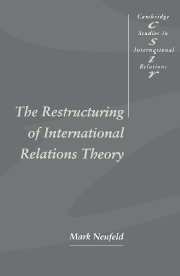Book contents
- Frontmatter
- Contents
- Acknowledgments
- Introduction
- 1 International Relations theory and the Aristotelian project
- 2 Defining positivism
- 3 Reflexivity and International Relations theory
- 4 Human consciousness and International Relations theory
- 5 International Relations theory and social criticism
- 6 Conclusion
- Notes
- Bibliography
- Index
- CAMBRIDGE STUDIES IN INTERNATIONAL RELATIONS
5 - International Relations theory and social criticism
Published online by Cambridge University Press: 15 December 2009
- Frontmatter
- Contents
- Acknowledgments
- Introduction
- 1 International Relations theory and the Aristotelian project
- 2 Defining positivism
- 3 Reflexivity and International Relations theory
- 4 Human consciousness and International Relations theory
- 5 International Relations theory and social criticism
- 6 Conclusion
- Notes
- Bibliography
- Index
- CAMBRIDGE STUDIES IN INTERNATIONAL RELATIONS
Summary
Hence, a theory of politics presents not only a guide to understanding, but also an ideal for action. It presents a map of the political scene not only in order to understand what that scene is like, but also in order to show the shortest and safest road to a given objective. The use of theory, then, is not limited to rational explanation and anticipation. A theory of politics also contains a normative element.
Hans J. MorgenthauTrue, the rationality of pure science is value-free and does not stipulate any practical ends, it is ‘neutral’ to any extraneous values that may be imposed upon it. But this neutrality is a positive character.
Herbert MarcuseIntroduction
In the preceding two chapters, we have reviewed the evidence for a critical restructuring of International Relations theory in terms of reflexivity and the conceptualization of human consciousness. There remains, however, one defining characteristic of critical theory that has not yet been discussed in relation to contemporary theorizing about International Relations. This is critical theory's engagement in social criticism in support of practical political activity for the transformation of established ‘forms of life’.
It is the task of the present chapter to address this issue. As some of the issues central to this task have already been encountered, this chapter will proceed somewhat differently from the previous two.
- Type
- Chapter
- Information
- The Restructuring of International Relations Theory , pp. 95 - 121Publisher: Cambridge University PressPrint publication year: 1995
- 1
- Cited by

